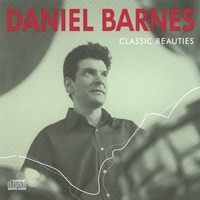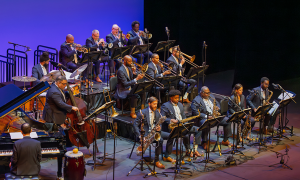Home » Jazz Articles » Live Review » Mark Murphy at Blues Alley, Washington, DC
Mark Murphy at Blues Alley, Washington, DC
His vocal palate is not constrained by time or key signatures, bar lines, or conventional musical phrases. These are merely elastic and fluid concepts to be utilized as expressive components in an ever expanding concept of fearless original artistry.
Blues Alley
Washington, DC
July 11, 2007
I may not be the most aggressive advocate of Blues Alley, but the intimate eighteenth-century carriage house in the Georgetown neighborhood of Washington, DC has been host to countless jazz legends for over forty years. The lackluster food, indifferent service and an increasingly commercial booking agenda can easily be a disincentive to all but the most intrepid jazz listener. However, it remains one of the few venues in the city where vocalist Mark Murphy can perform in relative comfort and intimacy. In a rare, and one-night appearance last week, Murphy assiduously displayed a panoply of vocal acrobatics and, in so doing, proved that he remains arguably the finest jazz singer in the business.
As is often the case at Blues Alley, those who attended the mid-week performance exhibited respect toward the artist and consideration toward the other members of the audience. But I've also attended a weekend show when, despite requests from club management to the contrary, audience members' conversation interrupted the listening experience. I vividly remember a Saturday evening show with Larry Willis/Buster Williams/Ben Riley where, not ten feet from the stage, a large group celebrated a birthday, loudly singing greetings and completely ignoring the performers on the stage. Thankfully, the crowd was hushed last Wednesday evening, and Murphy rewarded all of us with a heartfelt performance of great depth.
Age naturally transforms the vocal timbre. A great artist acknowledges the inevitable changes, grasps the involuntary alteration thrust upon him, and creates a different vocabulary in the context of the already established palate. Murphy has done so with considerable dexterity. His current tone is like a nearly burnt caramel, rich and dark in color, with a luxuriant texture and deep expressivity. In short, Murphy only gets better with every passing year.
Aided by his frequent pianist, Joshua Wolfe, and a band consisting of the best local players, Murphy began the first set with "Twisted," made famous by Annie Ross' lyric to Wardell Gray's solo. Murphy effortlessly jumped from articulated words to falsetto scatting and back. He held the microphone close to his lips, and moved it suddenly up and down; back and forth; gestures emphasizing his already astounding dynamic control.
Murphy explained that the next song was first introduced by "Alfalfa in The Little Rascals. There was nothing juvenile, however, in his delivery of "I'm Through with Love." Accompanied by only the piano, Murphy slowly meandered through the lyric, his voice infused with a hopeless and world- weary resignation. When the remaining portion of the rhythm section joined, their contribution was tasteful and unobtrusive, freely following Murphy's liberal phrasing. Bassist James King and drummer Nasar Abadey are frequently collaborators throughout the city, in Abadey's Supernova ensemble and in other noted groups. The result, as was evident on this particular night, is a symbiotic understanding of one another.
Murphy launched into Hoagy Carmichael-Johnny Mercer's "Skylark," again singing the opening as a duo with Wolfe. He breathed the opening stanza—"Is there a meadow in the mist? Where someone's waiting to be kissed? —but suddenly stopped. He paused—then continued by reciting a seemingly extemporaneous idea: "There she is, in a meadow, waiting. What is she waiting for? The trolley doesn't go there anymore. The meadow has been sold to the mall, and will be tarmac'ed in a year. She is waiting to be kissed. Brave girl... His voice trailed off, and the song continued, heartbreaking in its expression, utterly free with the bar lines. Murphy's allusion to present-day commercialism seemed to suggest the original idealistic quest is in vain: Mercer's plea to the songbird, "Won't you lead me there," replaced by the realization that it no longer can.
Local trumpeter Thad Wilson reminds one of Freddie Hubbard in any number of ways. Their facial expressions when playing are not dissimilar, and Wilson's stance with the flugelhorn is almost imitative. Moreover, Wilson's tone owes an obvious debt to Hubbard's lush and forceful playing. Perhaps this is why Murphy announced, "And now a trip to the 70's... when introducing Hubbard's "Red Clay," successfully recorded by the vocalist and a part of Murphy's repertoire since Mark Murphy Sings (Muse, 1975). The group established an appropriate and effective funk groove, and Murphy responded with an infectious delivery of one of his signature tunes.
It can be painful to watch some singers introduce songs. Some attempt forced humor. Others regurgitate obviously rehearsed stories, repeated with every performance. Murphy speaks to the audience with a heartfelt admission. He explained that he has "recorded sixty-five records that haven't sold. As a result, he asks himself "What am I doing? The chance meeting with German trumpeter and singer Till Brönner revitalized Murphy a few years ago, and the latter's new recording—Love is What Stays (Verve)— was made with the participation of Brönner. Murphy performed the title track to the record with flawless aplomb, and without the lush string arrangements which sometimes dominate the album.
Murphy concluded the first set by explaining that if he had been the director of Broke Back Mountain "Too Late Now would have been his choice for a concluding song. His performance of the tune was exhausting: it rolled from the vocalist's middle range and fell into baritone depths, lurching into high-pitched curves in the interim; it barreled into hapless acceptance; it ignored any regular rhythm or meter. It was, in short, a crushing and masterful interpretation.
There are many excellent singers. But merely enunciating the lyrics to an American popular standard, from whatever decade, with a clear voice and accurate intonation, does not make one a jazz singer, of which there have been but a handful. Such an individual must capture the free-form expressionism of an imaginative instrumentalist, and improvise within the context of predetermined lyrics. Murphy succeeds in this endeavor like no one else. His vocal character is not constrained by time or key signatures, bar lines, or conventional musical phrases. These are merely elastic and fluid concepts to be utilized as expressive components in an ever expanding concept of fearless, original artistry.
It had been over twenty years since this reviewer last heard Murphy in concert. May the next opportunity arrive much sooner.
Tags
PREVIOUS / NEXT
Support All About Jazz
 All About Jazz has been a pillar of jazz since 1995, championing it as an art form and, more importantly, supporting the musicians who make it. Our enduring commitment has made "AAJ" one of the most culturally important websites of its kind, read by hundreds of thousands of fans, musicians and industry figures every month.
All About Jazz has been a pillar of jazz since 1995, championing it as an art form and, more importantly, supporting the musicians who make it. Our enduring commitment has made "AAJ" one of the most culturally important websites of its kind, read by hundreds of thousands of fans, musicians and industry figures every month.























